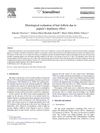 4 citations,
May 2021 in “Lasers in Surgery and Medicine”
4 citations,
May 2021 in “Lasers in Surgery and Medicine” Light therapy reduces scalp inflammation, boosts hair regrowth with Minoxidil 2%.
 1 citations,
March 2023 in “Phytochemistry Reviews”
1 citations,
March 2023 in “Phytochemistry Reviews” CBD may improve skin and hair health, but its effective use and safety need more research.
 January 2018 in “Stem cells in clinical applications”
January 2018 in “Stem cells in clinical applications” Exosomes show promise for tissue repair and regeneration with advantages over traditional cell therapies.
 32 citations,
November 2004 in “Journal of pharmaceutical sciences”
32 citations,
November 2004 in “Journal of pharmaceutical sciences” Different tea tree oil mixtures absorb into hair follicles at varying levels, with microemulsion being the most effective.
 27 citations,
December 2016 in “Dermatology and Therapy”
27 citations,
December 2016 in “Dermatology and Therapy” Certain skin conditions can indicate insulin resistance and should prompt lifestyle changes and medical treatment to manage underlying health issues.
 1 citations,
December 2023 in “Annals of Phytomedicine An International Journal”
1 citations,
December 2023 in “Annals of Phytomedicine An International Journal” Nanoemulgel improves delivery and effectiveness of plant-based drugs for various conditions.
 January 2024 in “Acta Facultatis Medicae Naissensis”
January 2024 in “Acta Facultatis Medicae Naissensis” Cosmeceuticals are important for managing skin issues during the COVID-19 pandemic.
 1 citations,
May 2022 in “Pharmaceutics”
1 citations,
May 2022 in “Pharmaceutics” Tea seed oil in nanostructured carriers stimulates hair growth and feels less greasy when applied.
 101 citations,
July 2020 in “Dermatologic therapy”
101 citations,
July 2020 in “Dermatologic therapy” COVID-19 can cause skin issues like rashes and "COVID toes," and people with skin conditions should adjust their treatments if they get the virus.
 4 citations,
September 2014 in “Elsevier eBooks”
4 citations,
September 2014 in “Elsevier eBooks” Use some skin medications with caution during pregnancy; avoid strong steroids, certain eczema treatments, and systemic retinoids, but many topical treatments and nasal sprays are safe.
 July 2023 in “IntechOpen eBooks”
July 2023 in “IntechOpen eBooks” New treatments for alopecia areata show promise, but more research is needed to confirm their effectiveness.
 August 2024 in “Journal of the Korean Society of Cosmetology”
August 2024 in “Journal of the Korean Society of Cosmetology” Wild peach leaf extract improves hair strength, thickness, and shine after dyeing.
 1 citations,
July 2019 in “British Journal of Dermatology”
1 citations,
July 2019 in “British Journal of Dermatology” Minoxidil was more effective than laser therapy for hair loss, and the report also highlighted the need for more research on PRP for a different hair loss condition, the impact of social media on alopecia views, and a warning on turmeric causing nail discoloration.
5 citations,
December 2023 in “Materials” Organic and biogenic nanocarriers can improve drug delivery but face challenges like consistency and safety.
 164 citations,
April 2008 in “Cochrane library”
164 citations,
April 2008 in “Cochrane library” Current treatments for alopecia show no significant long-term benefits.
 1 citations,
August 1946 in “Archives of dermatology”
1 citations,
August 1946 in “Archives of dermatology” The meeting highlighted the complexity and variability of skin conditions and differing opinions on their diagnoses and treatments.
 November 2024 in “International Medical Case Reports Journal”
November 2024 in “International Medical Case Reports Journal” Glucocorticoid treatment in lupus can cause oral lesions, which need early diagnosis and comprehensive care.
 2 citations,
January 2009 in “Actas Dermo-Sifiliográficas”
2 citations,
January 2009 in “Actas Dermo-Sifiliográficas” Scalp psoriasis treatments like strong corticosteroids and vitamin D3 analogues are effective, especially when combined.
 5 citations,
February 2013 in “Dermatology and therapy”
5 citations,
February 2013 in “Dermatology and therapy” Crescina® lotion helps reduce hair loss and increase hair growth in males with androgenetic alopecia.
 July 2022 in “http://isrctn.com/”
July 2022 in “http://isrctn.com/” Adding a cosmetic gel with caffeine, taurine, and growth factors to standard hair loss treatments could improve results.
 13 citations,
January 2007 in “International journal of pharmaceutics”
13 citations,
January 2007 in “International journal of pharmaceutics” Papain cream removes hair better than papain gel, causing hair follicles to widen and skin to thicken.
 53 citations,
February 2020 in “Expert Opinion on Pharmacotherapy”
53 citations,
February 2020 in “Expert Opinion on Pharmacotherapy” Finasteride and minoxidil work best together for hair loss.
 40 citations,
August 2018 in “Skin appendage disorders”
40 citations,
August 2018 in “Skin appendage disorders” Some alternative treatments for hair loss might work, but more research is needed.
 13 citations,
December 2017 in “BMC Complementary and Alternative Medicine”
13 citations,
December 2017 in “BMC Complementary and Alternative Medicine” The Asian herbal mix with Houttuynia cordata, Perilla frutescens, and green tea helped grow hair in mice.
 8 citations,
January 2020 in “Skin Pharmacology and Physiology”
8 citations,
January 2020 in “Skin Pharmacology and Physiology” Caffeine improves hair growth, thickness, and reduces shedding.
 46 citations,
October 2012 in “Dermatologic Clinics”
46 citations,
October 2012 in “Dermatologic Clinics” Female pattern hair loss diagnosed by scalp appearance, treated with combined therapies and targeted approaches.
 21 citations,
January 2017 in “Skin Pharmacology and Physiology”
21 citations,
January 2017 in “Skin Pharmacology and Physiology” Caffeine-based liquid 0.2% is as effective as minoxidil 5% for treating male hair loss.
 1 citations,
July 2017 in “Journal der Deutschen Dermatologischen Gesellschaft”
1 citations,
July 2017 in “Journal der Deutschen Dermatologischen Gesellschaft” Topical caffeine improves hair loss intensity, speed, and shedding, and works better with minoxidil/azelaic acid.

Caffeine can potentially treat common hair loss by counteracting hair follicle shrinkage caused by hormones.
 151 citations,
May 2014 in “American Journal of Clinical Dermatology”
151 citations,
May 2014 in “American Journal of Clinical Dermatology” Effective treatments for male pattern baldness include oral finasteride and topical minoxidil, while topical minoxidil is best for female pattern baldness.





























